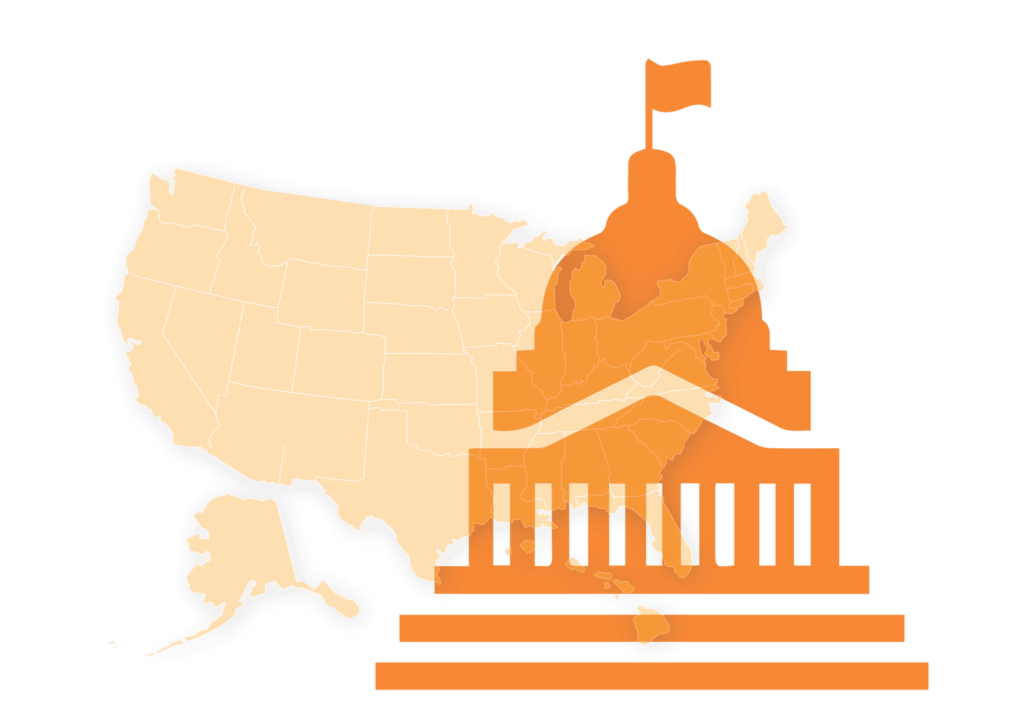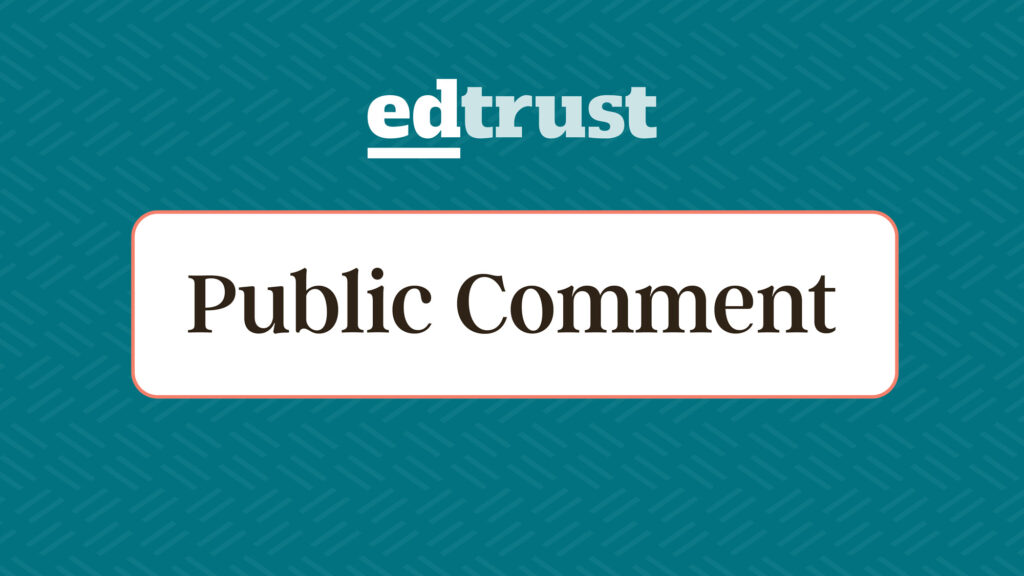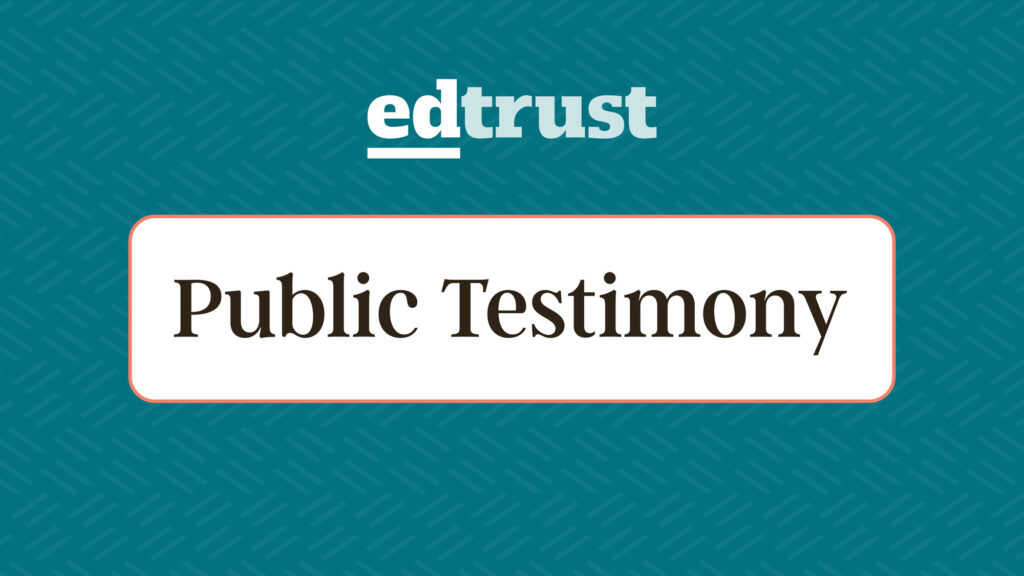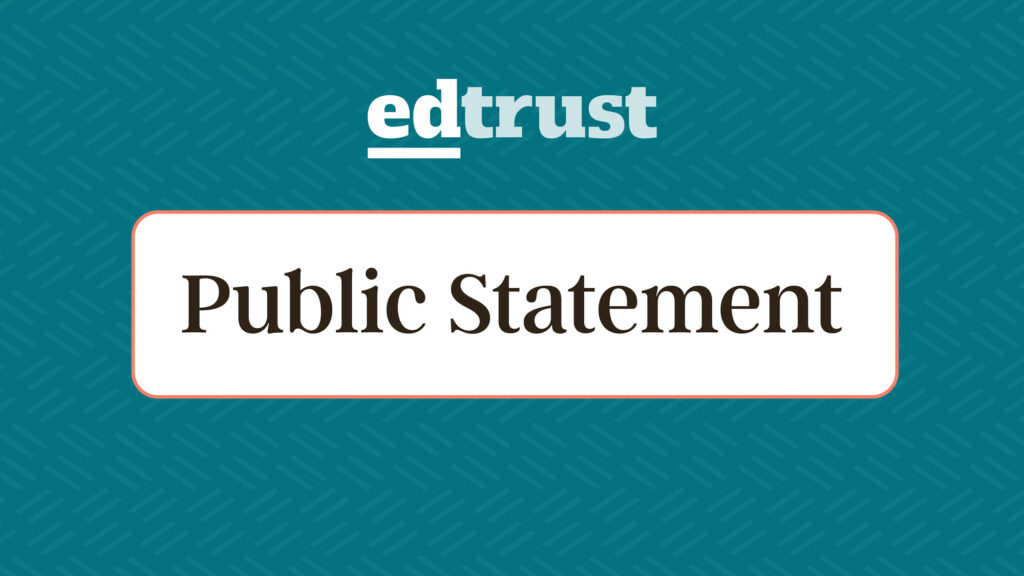On behalf of The Education Trust, an organization dedicated to closing long-standing gaps in opportunity and achievement separating students from low-income backgrounds and students of color from their peers, thank you for the opportunity to present testimony on the FY21 Labor, Health and Human Services, Education and Related Agencies (L-HHS-ED) Appropriations bill. We request that the L-HHS-ED bill receive its proportional share of the discretionary increase in the FY21 budget caps to ensure that essential education programs have the resources they need.
It is important to acknowledge that this year’s appropriations process is operating during an unforeseen and unprecedented crisis. The Education Trust has articulated our views on what must be done in separate, uncapped stimulus packages to provide for our nation’s students and protect our public education systems in face of the ongoing massive challenges posed by the coronavirus pandemic. During this pandemic, we call on Congress to take swift action to:
- Double the Pell Grant and make it non-taxable in the face of widespread job loss, uncertainty about college enrollment, and structural racial and financial inequities in college access and attainment;
- Appropriate at least $250B for states to help combat coronavirus-related declines in financial support for public P-12 and higher education systems, accompanied by maintenance of effort provisions that ensure state investments do not decline past recent levels;
- Invest at least $6B in expanding broadband access to both K-12 and college students who are increasingly likely to be remote learning into academic year 2020-2021;
- Continue to fund and expand the Pandemic EBT program, eliminate barriers for students and families in accessing SNAP benefits, and provide continued flexibility for the Department of Agriculture (USDA) to extend relevant nationwide and state-by-state waivers to ensure that meals can be served to children in whatever form is safe and necessary during the summer and while students cannot return to school;
- Maintain the suspension of student loan payments and interest for all federal loans, and authorize targeted student loan forgiveness provisions to give relief to millions of borrowers;
- Create a dedicated funding stream to address learning loss and summer slide made available to LEAs for summer school and extended learning opportunities for students and schools with the highest need for summer 2020, academic year 2020-2021, and summer 2021; and
- Create a dedicated funding stream to address the need for increased academic, social-emotional, and physical supports for students, educations, and families during and in the aftermath of the coronavirus crisis.
We look forward to working with staff on these priorities and others in the ongoing stimulus and relief process as the crisis continues to unfold over the coming months.
Regarding the regular appropriations process, while there are many programs under your jurisdiction that are critical to advancing equity, for FY21, The Education Trust is focused on the following: strengthening the Pell Grant program by increasing the maximum award $156 to keep pace with inflation, at a minimum; protecting the existing Pell Grant reserve; supporting teachers and school leaders by level funding ESSA’s Title II-A ($2.13B), the Teacher and School Leader Incentive Program ($200M), the Supporting Effective Educator Development Program ($80M), HEA’s Title II’s Teacher Quality Partnership grants ($50M); and restoring funding to the School Leader Recruitment and Support Program ($14.5M). Finally, we request that the Augustus Hawkins Centers, which support enhanced educator preparation for teaching candidates at HBCUs and MSIs, receive $40M in funding for FY21. We are encouraged by the slight increase in funding levels provided by the House Subcommittee on Labor, Health and Human Services, Education and Related Agencies (L-HHS-ED) in the last appropriations cycle for some of these initiatives and urge continued support for these critical programs.
Strengthening the Pell Grant Program
The Pell Grant program is the cornerstone of federal financial aid. Created in 1972 as the Basic Educational Opportunity Grant, the program benefits over 7 million students annually and continues to serve as the primary federal effort to open the door to college for students from low-income backgrounds. Over one-third of White students, two-thirds of Black students, and half of Latino students rely on Pell Grants every year.1 Pell Grant dollars are well-targeted to those in need: 83 percent of Pell recipients come from families with annual incomes at or below $40,000, including 44 percent with annual family incomes at or below $15,000.2
Increasing the Maximum Award and Protecting the Pell Reserve
The Pell Grant program’s impact is shrinking as the maximum award has failed to keep pace with the rapidly rising cost of college. The purchasing power of the Pell Grant has dropped dramatically since the program’s inception. In 1980, the maximum Pell Grant award covered 77 percent of the cost of attendance at a public university. Today, it covers just over 28 percent, the lowest portion in over 40 years. If the maximum award continues to stagnate, the grant will cover just one-fifth of college costs in 10 years.
We very much appreciate previous increases to the maximum award in prior appropriations bills, and we respectfully request that you continue to increase the maximum award amount. For FY21, Congress should, at minimum, increase the maximum award by $156 to $6,501 to keep pace with inflation. As indicated above, we also ask Congress to include within the forthcoming coronavirus stimulus package provisions to double the Pell Grant, helping to reverse the downward trend of Pell’s purchasing power, ensuring that the maximum Pell award covers at least half of the cost of attendance at a public four-year institution.
Congress should also ensure that the program’s reserve funds remain within the program. Students and families already needed help paying for college, and the pandemic will only make the amount of help they need even greater. It remains unclear how the combination of the pandemic and an economic recession will affect net college enrollment. However, current unemployment is the highest it has been since the Great Depression, and this may result in a surge in college enrollment like the one during the previous recession. Cuts to Pell, especially in this context, could quickly put the program in jeopardy and generate unnecessary uncertainty for students. If used for anything, the Pell reserve should be used to improve and expand Pell.
Supporting Teachers and School Leaders
Research and experience show the powerful impact that teachers and school leaders have on student learning. ESSA’s Title II program provides grants to states and districts that can be used to invest in and develop the education profession. These funds can be used to, among other things, address inequities in access to effective teachers and school leaders, provide professional development, and improve teacher recruitment and retention. States and districts can also apply for additional competitive grant dollars for programs targeted at specific, evidence-based strategies for improving teacher and school leader effectiveness and increasing educator diversity. Additionally, HEA’s Title II Teacher Quality Partnership grants (TQP), awarded to partnerships of high-need districts and teacher preparation programs at institutions of higher education, can be used to recruit underrepresented populations to the teaching profession. As Ed Trust’s work continues to demonstrate the positive impact that diverse teachers and school leaders of color can have on the academic achievement of both students of color and White students, we remain supportive of federal dollars to increase and bolster the diversity of the educator pipeline.
Maintain funding for ESSA’s Title II-A (Supporting Effective Instruction), the Teacher and School Leader Incentive Program (TSLIP), the Supporting Effective Educator Development (SEED) program, and HEA’s Title II Teacher Quality Partnership (TQP) grants
Despite the nationwide attention to the need to invest in educators, President Trump’s FY21 budget request again called for the elimination via block grant of the Title II-A grant, the SEED program, the TSLIP, and HEA’s Title II Teacher Quality Partnership grants. We appreciate Congress’ prior rejection of similar requests in the FY19 omnibus appropriations bill.
At a minimum, in FY20, Congress should continue funding Title II-A, TSLIP, SEED, and TQP at FY20 levels: $2.13B, $200M, $80M, and $50M, respectively.
Fund the Augustus Hawkins Centers of Excellence Grant Program
Research has shown that students of color benefit tremendously from having teachers of color, particularly one of the same racial background: they are less likely to be chronically absent or suspended from school, more likely to be recommended for gifted and talented programs, and low-income Black students who have a Black teacher for at least one year in elementary school are less likely to drop out of high school and more likely to consider college. Despite students of color making up a majority of students in public schools, the diversity gap for teachers of color still exists in every state.
The nationwide impact of HBCUs, MSIs, HSIs, and TCUs on producing teachers of color cannot be overstated. HBCUs, TCUs, and MSIs, collectively, award only 11% of the nation’s bachelor’s degrees in education, yet they produce more than 50% of the bachelor’s degrees earned in education by Hispanic and Native Hawaiian and Pacific Islander students.3 HBCUs graduate approximately 50% of the nation’s African American teachers with bachelor’s degrees.4 HSIs prepare 90% of Hispanic teachers, and along with other MSIs, constitute a vital pipeline to maintain diversity among our nation’s teachers.5
In light of the importance of these institutions and the increased needs they experience as a result of graduating an outsized portion of the nation’s teachers of color, we request that the Augustus Hawkins Centers of Excellence Grant program receive funding for the first time since its creation in the bipartisan Higher Education Act of 2008. The program would provide critical funding to these key institutions to provide increased and enhanced clinical experience and increased financial aid to prospective teachers of color, who face higher burdens in college access and affordability than their White peers.
For FY21, Congress should fund the Augustus Hawkins Centers of Excellence Grant Program at $40M.
Restore Funding for the School Leader Recruitment and Support Program
Landmark research funded by the Wallace Foundation has found “virtually no documented instances of troubled schools being turned around without intervention by a powerful leader,” and the School Leader Recruitment and Support Program is the only federal program specifically focused on investing in evidence-based, locally driven strategies to strengthen school leadership in high-need schools. A recently concluded seven-year study of school districts that created pipelines to develop school leaders saw increasing gains in student achievement over time, showing how a sustained initiative can demonstrate positive effects on student learning.
It is also worth noting that the need to develop strong and diverse school leaders has only been heightened due to the coronavirus pandemic. The school closures taking place across America are disproportionately hurting students from low-income backgrounds and students of color, and they need teachers and leaders who are supported and qualified to tackle the historic learning loss and trauma they are facing. In order to effectively counter those growing problems, funding must be in place to ensure those diverse teachers and leaders get the training they need to stay in the classroom.
During the past decade, we have learned a lot about what works in education leadership — lessons made possible, in part, by federal investments in the School Leader Program (the previous iteration of the SLRSP). There is still a great deal of work to do, especially when it comes to identifying and efficiently preparing effective turnaround leaders, as well as sustainably supporting them to accelerate academic achievement, close gaps, and maintain improvement over time for all students and in every community. The SLRSP is a key lever for seeding the next generation of effective school leader development programs, promoting equity, advancing ongoing innovation, and sharing cutting-edge lessons on transformational leadership with the broader field.
For FY21, Congress should restore funding for the School Leader Recruitment and Support Program to $14.5M, its FY17 appropriation level.
Thank you for the opportunity to submit testimony. The Education Trust looks forward to working with Congress to allocate federal funds in a way that addresses the critical equity gaps that our nation’s students from low-income backgrounds and students of color continue to face. We are happy to respond to any questions or concerns that you may have on these topics, and look forward to continuing to work with you on coronavirus response stimulus and relief and through the FY21 appropriations process.
- Congressional Budget Office (CBO), January 2017 baseline projections for the Pell Grant program, http://bit.ly/2mLy0nk, Table 2; and Ed Trust calculation NPSAS:12 using PowerStats.
- Analysis of Federal Pell Grant Program Annual Data Report, available at https://www2.ed.gov/finaid/prof/resources/data/pell-data.html.
- Branch Alliance for Educator Diversity, “Homepage,” available at https://www.educatordiversity.org/.
- Jacqueline Jordan Irvine and Leslie T. Fenwick, “Teachers and Teaching for the New Millennium: The Role of HBCUs,” The Journal of Negro Education 80 (3) (2011): 197–208, available at http://www.jstor.org/stable/41341128; National Association for Equal Opportunity in Higher Education: Comments to the Department of Education proposed rule changes for teacher preparation programs available at: http://nafeonation.org/wp-content/uploads/2015/01/NADEC_Teacher_Prep_Regulations_Discussion_Document_2-2-15__.pdf.
- Hispanic Association of Colleges and Universities, “Teacher Diversity,” https://www.hacuadvocates.net/teacherdiversity?1.






 August 28, 2025 by
August 28, 2025 by 
